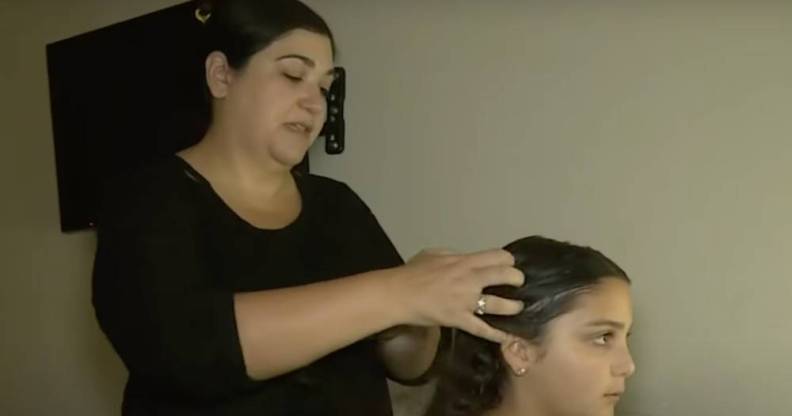Proud mum faces having to send trans daughter to $20,000-a-year school just so she can play sports

Lisa Stanton says it was tough when the trans sports ban went into effect in Texas as she felt it was the day her daughter became a “second-class citizen”. (YouTube/KPRC 2 Click2Houston)
A Texas mum is considering shelling out huge costs for private schools to ensure her trans daughter has a gender-affirming experience in education.
Lisa Stanton is among a slew of parents who have been viciously fighting against anti-trans legislation in Texas. In January, the state enacted a law that would prohibit transgender girls and women, like Stanton’s daughter Maya, from playing on school sports teams that align with their gender identity.
Stanton, who has long fought against the ban, told PinkNews that the day the anti-trans law went into effect was “tough”.
“What’s weird – surreal – about it is that no one else in our lives realises what’s happening on that day,” she explained. “Everybody else is going about their normal business, but it’s like, ‘Oh, my child’s officially a second-class citizen as of today’.”
Right now, Maya’s day-to-day routine hasn’t been impacted by the ban, as she’s not on a sports team in elementary school. But as she moves through school, that’s likely to change.
As such, Stanton said the family has been forced to “really think” about enrolling Maya in a private school. She told PinkNews that private schools are not subjected to University Interscholastic League regulations (the athletic governing body for public schools in Texas), so private school teams “play in a different league”.
“Depending on the school, the policies will be different,” Stanton said. “So we’re investigating and kind of looking into what options there would be if she wanted to play, what schools would be affirming and would it cause an issue for their teams.”
But switching schools is an issue that the family is “having to grapple with” because they’re “strong believers in public education” – and it goes without saying that sending Maya to a private school would also be “financially really taxing”.
“To pay $20,000 a year [for school fees] – that’s just not something that we’re in a position to do,” Stanton said. It’s a catch-22 situation, as naturally, the family doesn’t want Maya to miss out on having a gender-affirming education and being able to participate fully in education and sports.
“Maya is never going to be like a superstar athlete – not with my genes – but she enjoys being with friends, doing an activity together and feeling a part of something,” Stanton said.
She added: “We all know that being active is good not just for your physical health but also your mental health.
“It gets those endorphins up, and my child is going to be in an environment where she is ‘othered’ constantly because she doesn’t get to engage in that within the public education system in Texas.”
Rights groups across the US are fighting anti-trans sports bans
Texas governor Greg Abbott signed House Bill 25 (HB 25), which requires that student-athletes play on sports teams that correspond to the sex listed on their birth certificate received at or near the time of their birth, last October.
Brian Klosterboer, staff attorney for the ACLU of Texas, told PinkNews that the law is different to those passed in states such as Idaho and West Virginia, and that it remains unclear how it will be enforced.
Klosterboer explained that the text of the Texas bill requires the University Interscholastic League (UIL) “to create rules and guidance on exactly how it will be enforced”.
Klosterboer said the UIL previously “just went by a student’s birth certificate and the gender listed on that birth certificate”, which was “already deeply discriminatory and harmful for transgender youth”.
Though discriminatory, this was “enforceable just by looking at someone’s birth certificate”. However, the new law says schools and coaches much “go based on biological sex”, which is “not a term that exists in either state or federal law”.
Because the law is “really unclear on how it can be implemented or enforced”, the ACLU of Texas is “actively monitoring what school districts are doing” as well as what UIL is doing.
A legal challenge has not been raised, but Klosterboer said that “no option is off the table”.
“There are a number of court cases that are dealing with the same issue and that are going to inform what a court would do here in Texas.”
Enforcement of similar laws has been halted in Idaho and West Virginia as courts battle over the laws, while in November, several LGBT+ advocates – including the ACLU, the ACLU of Tennessee and Lambda Legal – brought a lawsuit challenging a trans sports ban in Tennessee.
Klosterboer said the ACLU is hoping that school districts and UIL will acknowledge that they should follow the federal constitution and Title IX, a federal civil rights law that prohibits sex-based discrimination in any school or education programme that receives federal funding.
In June, the US Department of Education said it extended Title IX protections to LGBT+ students on the basis of sexual orientation and gender identity.
Shelly Skeen, senior attorney for Lambda Legal, told PinkNews that the firm has worked with the ACLU before to “stop similar discriminatory laws targeting trans youth”.
Skeen added that HB 25 directly targets “trans youth and seeks to exclude them from participation in the activities and opportunities available to all students”.
“By targeting trans youth and separating them from other students on the playing field, HB 25 ostracises them and marginalises them from their peers and in doing so harms their mental, physical and social well being,” Skeen said.
“Laws that target and harm a specific group for no compelling reason are discriminatory and unconstitutional.”

